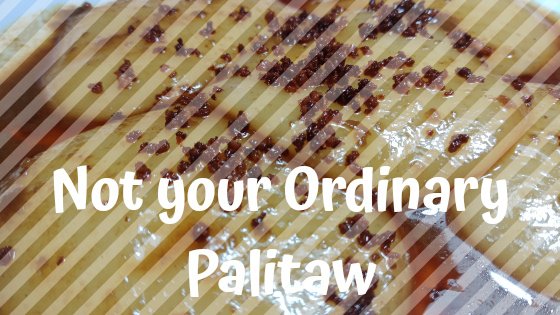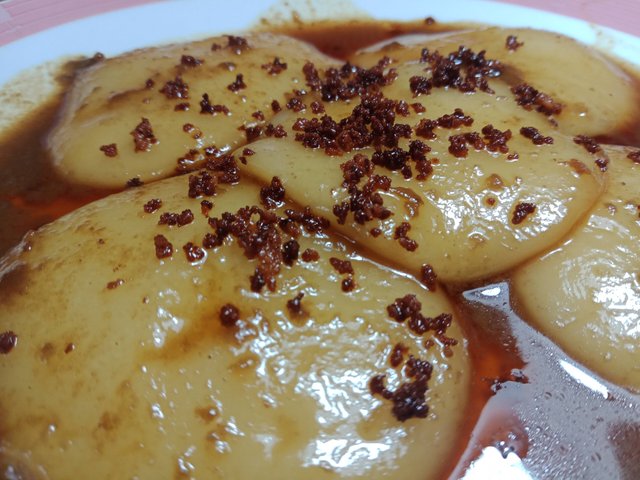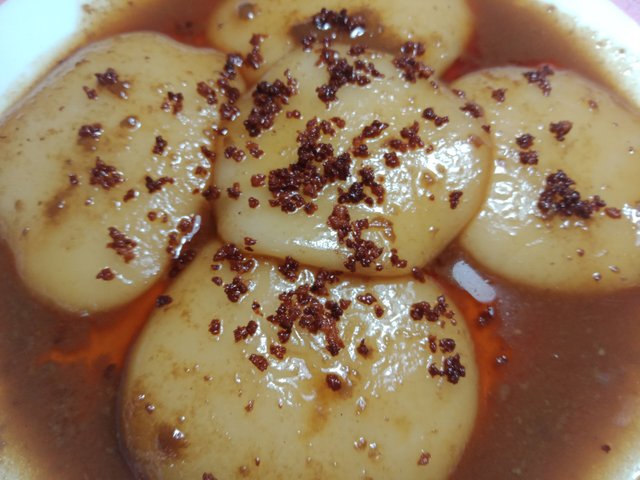
Palitaw got its name from the method of knowing if it's already cooked. It is made of a thick mixture of glutious rice flour and water, flattened, and then cooked in boiling water. You'll know it's cooked once the flattened rice flour floats on the surface making it visible (litaw in tagalog). Normally, once it's cooked, it will be drenched in coconut grated coconut with sugar and sesame seeds. My mom often served this for our afternoon snacks back in the day. Today, I decided to make it a little bit sweeter than usual.
I found this recipe on facebook a couple of days ago and I have been craving ever since. And today is the day I finally satisfied that craving.
Ingredients:
2 1/2 cups Glutinous rice flour (If you're like my mom, you'd buy glutinous rice at the market and have it ground)
1 cup Coconut cream (in tagalog, we call this the kakang gata or the coco milk you'll get on the first squeezing or extraction from grated coconut)
2 cups Coconut milk (coco milk from the second squeeze)
1 cup brown Sugar
1/2 tsp salt
1 cup water
Procedure:
First, make the palitaw mixture. To do this, mix water and glutinous rice. You'd like to slowly add water as you mix until you get the perfect consistency. It should not stick to your hand or on the bowl. Get a spoonful, roll it in your palm, then flatten it to form a circular or oval shape.

It's funny how one can see which is the first batch and the second. This is obviously my second batch of molded palitaws. The first batch was beyond recognition.
Once you've shaped all of the mixture, put them in a pot of boiling water. Make sure that the water is already boiling before you put the palitaw mix. Once they float, remove them from the water and set aside.
Then, make the latik or caramelized coconut cream. Just boil 1 cup of coconut cream on low heat. Once it boils, continuously stir until you see oil coming out and the coconut starts to curdle. You need to continue stirring until the curdle starts to brown. Remove from heat once it's a tad darker than golden brown. You don't want to burn it too much.
Lastly, cook the sauce. To do this, dissolve 1 cup of sugar in 2 cups of coconut milk. Add half teaspoon of salt. I was also told to do this when I cooked the champorado a couple of days ago. My teacher in grade school said it was to add some sort of contrast to the taste. Once the sugar has been completely dissolved, cook in low fire until the sauce thickens. Once you see the sauce thicken, add the palitaw you cooked earlier. Then add the latik. Make sure to drain the oil first.
My mom said the oil from latik is good for the hair and scalp so if you want, you can also apply it on your scalp once the oil cools down. It'll give your hair an extra shine and smooth. It kinda smells a bit strong though so make sure to wash your hair properly after soaking it in coconut oil.

This method of cooking palitaw is new to me. In fact, this is the first time I cooked palitaw. I still prefer the old method where it is drenched in sugar/grated coconut/sesame seeds. But if you're one with a sweet tooth, this is perfect for you. It's super super sweet. Oh, you could also add langka and pandan leaves to give it some extra flavors.

Thanks for using eSteem!
Your post has been voted as a part of eSteem encouragement program. Keep up the good work! Install Android, iOS Mobile app or Windows, Mac, Linux Surfer app, if you haven't already!
Learn more: https://esteem.app
Join our discord: https://discord.gg/8eHupPq
Downvoting a post can decrease pending rewards and make it less visible. Common reasons:
Submit
Juice ko poh, bakit bawat basa ko sa posts mo ay sadyang ang mga favorite ko ang subject! This kind of palitaw looks extra ordinary!
Downvoting a post can decrease pending rewards and make it less visible. Common reasons:
Submit
Hhaha. Kain! Kung mahilig ka sa matamis, magugustuhan mo tong style na to. Ako kasi, mas gusto ko yung binubudburan ng niyog, sugar at sesame seeds.
Downvoting a post can decrease pending rewards and make it less visible. Common reasons:
Submit